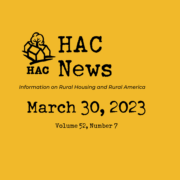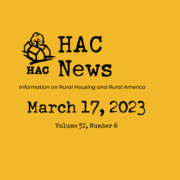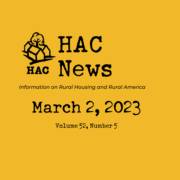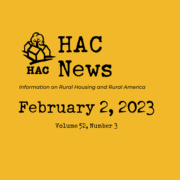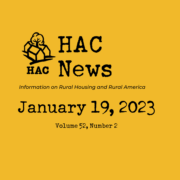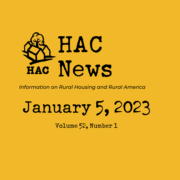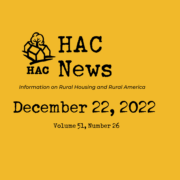HAC News: March 30, 2023
TOP STORIES
USDA and HUD predict impact of proposed funding cuts
House Appropriations Committee Ranking Member Rosa DeLauro (D-Conn.) asked heads of federal agencies about the impact of cutting FY24 discretionary spending back to FY22 levels. USDA Secretary Tom Vilsack responded that between 40,000 and 63,000 of the 288,000 tenant households currently receiving USDA Rental Assistance would lose that aid. The resulting loss of rental income could cause property owners to defer maintenance and fall behind on loan payments, Vilsack noted. HUD Secretary Marcia Fudge’s reply predicted mass evictions, increased homelessness, exacerbated dire housing conditions in Indian Country, and more.
HUD sets schedule for applying Buy America requirements
HUD has established an implementation schedule for applying the new Buy America preference for U.S.-made construction components. As of February 22, 2023, the requirements apply to iron and steel products used in infrastructure projects funded with new Choice Neighborhood, Lead Hazard Reduction, and Healthy Homes Production Grants. For most products in most other programs, the requirements will take effect in 2024. HUD has not yet provided further guidance on what activities under these programs will be considered to be infrastructure projects. This schedule does not apply to Tribes and Tribal entities because the requirements are waived temporarily for them under a separate notice, although the Tribal waiver will expire after May 14, 2023.
USDA explains timing for eligible areas review
USDA RD has posted details about the eligible areas review process, adding to the information previously available. (The new notice came from the Section 502 guarantee office but applies to all housing programs.) The new details include copies of all notices issued by State Offices between March 8 and 10 indicating where RD is reviewing population changes to determine whether area eligibility changes are required. The public now has 90 days to submit comments. Before final decisions are made, the public will have 30 days to review comments received from the 90-day notice, a description of any proposed boundary revisions, and a revised eligibility map. RD tentatively plans to make new boundaries effective on October 2, 2023, at the beginning of fiscal year 2024. For more information or to submit comments, contact the relevant State Office. Sign up here to receive email notices from your state (and other USDA RD notices).
HAC invites workshop proposals for October 2023 National Rural Housing Conference
HAC requests workshop proposals for its 2023 conference, to be held October 24-27 (with workshops on October 25 and 26) in Washington, DC. Workshops should seek to align themselves with the conference theme – Build Rural – or one of the following threads: Housing Affordability, Development, Preservation, Community Facilities, Rural Prosperity, Placemaking, Capacity Building, Housing Justice, or other adjacent threads. Proposals are due June 2. For more information, contact Kelly Cooney or Diane Hunter, HAC.
RuralSTAT
While racial/ethnic diversity has generally increased over the past 10 years among tenants of rental housing financed with USDA loans, the proportion of American Indian and Alaska Native (AIAN) tenants has not changed. In 2012, 68% of tenants were white, non-Hispanic; 18.5% were Black, non-Hispanic; 10.7% were Hispanic; and 1.7% were AIAN. In 2022, 64.4% were white, 20.4% were Black, 12% were Hispanic, and 1.7% were AIAN. Source: USDA Multi-Family Housing Annual Fair Housing Occupancy Reports, 2012 and 2022.
OPPORTUNITIES
USDA offers disaster repair grants for homeowners
USDA is now accepting applications for Single Family Housing Rural Disaster Home Repair Grants, newly funded in the final FY23 omnibus appropriations bill. Grants of up to $40,675 are available for low- and very low-income homeowners in rural places that experienced presidentially declared disasters in calendar year 2022. Very low-income homeowners may also be eligible for Section 504 loans and grants. For more information, contact a USDA RD office.
Fair housing education and outreach funds offered
HUD has opened a supplemental Fair Housing Initiatives Program Education and Outreach Initiative. Eligible applicants are Qualified Fair Housing Enforcement Organizations, Fair Housing Enforcement Organizations, public and private nonprofits, state and local governments, and agencies that participate in the Fair Housing Assistance Program. The deadline is May 11. For more information, contact Stephanie W. Thomas, HUD, 202-402-6938.
Community Connect broadband grants available
Nonprofits, for-profits, and state, local, and Tribal governments may apply by June 20 for Community Connect grants to construct rural broadband networks. For more information, contact Randall Millhiser, USDA RD, 202-578-6926.
Advisory Committee on Minority Farmers nominations open
The committee’s 15 members will include historically underserved farmers and ranchers, as well as representatives of minority serving institutions of higher education and community-based nonprofits, and people with civil rights and equity expertise. Nominations are due April 24. For more information, contact R. Jeanese Cabrera, USDA, 202-720-6350.
REGULATIONS AND FEDERAL AGENCIES
HUD seeks input on NSPIRE scoring and ranking
The most recent step in HUD’s implementation of National Standards for the Physical Inspection of Real Estate (NSPIRE) is a notice requesting comments on proposed NSPIRE physical inspection scoring and ranking methodology. HUD previously published a proposed regulation for NSPIRE and proposed standards. NSPIRE applies to public housing and multifamily housing programs, including Housing Choice Vouchers, Section 8 Project-Based and other assisted housing, the Section 202 and 811 programs, and HUD-insured multifamily housing. Comments are due April 27. For more information, contact Tara J. Radosevich, HUD, NSPIRERegulations@hud.gov.
New temporary authorization to help address RD backlogs
Effective immediately, additional staff in USDA RD State Offices may receive temporary authority to make some decisions regarding Section 502 direct and Section 504 applications. The change is intended to help reduce application backlogs. For more information, contact a State Office.
Cost burden increased among USDA tenants, annual occupancy report shows
Characteristics of tenants in Section 515 and 514 properties remained largely the same from October 2021 to October 2022, USDA’s annual data report indicates. There were 3,154 fewer units in 2022 than in 2021, with a decrease of 158 Section 515 properties and 7 Section 514 FLH properties. In 2022, average annual income for all tenants was $15,502, while the average income for those receiving Section 521 Rental Assistance was $12,989. The number of cost-burdened households, which fell dramatically from 41,121 in 2020 to 3,227 in 2021 because the American Rescue Plan Act provided additional RA, rose to 4,975 in 2022. Past occupancy data reports are available on HAC’s website.
HUD suggests changes related to floodplains
A proposed regulation is intended to improve the resilience of HUD-assisted or financed projects to the effects of climate change and natural disasters and provide for greater flexibility in the use of HUD assistance in floodways under certain circumstances. Comments are due May 23. For more information, contact Lauren Hayes Knutson, HUD, 202-402-4270.
Some USDA loan limits revised
Limits for USDA Section 502 direct loans have been revised for some places in Florida, New Jersey, and Virginia. For more information, contact an RD office.
HUD returns to 2013 disparate impact rule
HUD is reversing a change it made in 2020 to its fair housing discriminatory effects regulation and is reinstating a 2013 rule governing fair housing violation claims based on policies or actions with “disparate impacts” on categories of people protected by the Fair Housing Act. HAC supported this step when it was proposed. It requires no changes in practice because the 2013 rule remained in effect while the 2020 version was challenged in court.
EVENTS
Register now for upcoming HAC trainings
HAC Spring Training will be held April 11-13 in San Diego, with three different segments: “Housing and Services for Rural Veterans: A Symposium,” “Leading an Organization in Changing Times,” and “Creating Sustainable and Affordable Housing: A Workshop on Green Building Principles.”
Overcoming Cost Barriers: Innovative Approaches to Construction with Smart Building Techniques, Volunteers, and Sweat Equity is a series of five webinars:
- Fostering Skilled Labor in Your Community was held March 22, and the materials and recording are posted online;
- Benefits of Using Pre-Assembled Building Components, April 26;
- Implementing Change in Your Organization/Adopting Alternative Construction Techniques, June 7;
- Emerging Construction Techniques, June 14; and
- Modular and Manufactured Homes, June 28.
Webinar to review federal funding for rural development
Seizing the Moment: Rural Development Hubs and the Historic Opportunity for Federal Resources, a new Rural Opportunity and Development (ROAD) Session, will be held on April 12. The webinar is hosted by Aspen Institute’s Community Strategies Group in collaboration with HAC, the Rural Community Assistance Partnership, Rural LISC, the International Economic Development Council, and the Federal Reserve Board.
Equity and resiliency connections to be covered
Rural Affordable Housing: Equity and Resiliency, a webinar offered on April 11 by the Technical Assistance Collaborative, will examine steps to center equity and mitigate effects of future disasters for vulnerable populations through thoughtful building and rebuilding.
PUBLICATIONS AND MEDIA
Disaster guide online for survivors of southern tornadoes
HAC’s thoughts are with our rural partners and communities affected by the recent tornadoes in Mississippi and Alabama. HAC offers an online resource guide with information for individuals and families in the disaster area. Other disaster resources from HAC include Rural Resilience in the Face of Disaster and a Disaster Response for Rural Communities Guide.
Blog considers how states and localities can support rural justice
Identifying Policies That Advance Racial & Economic Justice in Rural Places, a ChangeLab Solutions blog post, highlights several policies that “hold high potential to address multiple dimensions of oppression for BIPOC rural communities – for example, funding for Native arts programs; Native tourism alliances; targeted and local hiring; agricultural workers’ rights; funding and support for small water systems; broadband expansion; and reparations.”
HAC
National Rural Housing Conference set for October
Mark your calendars and save the date! HAC’s National Rural Housing Conference will be held October 24-27 in Washington, DC and online.
Need capital for your affordable housing project?
HAC’s loan fund provides low interest rate loans to support single- and multifamily affordable housing projects for low-income rural residents throughout the U.S. and territories. Capital is available for all types of affordable and mixed-income housing projects, including preservation, new development, farmworker, senior and veteran housing. HAC loan funds can be used for pre-development, site acquisition, site development, construction/rehabilitation and permanent financing. Contact HAC’s loan fund staff at hacloanfund@ruralhome.org, 202-842-8600.
Please note: HAC is not able to offer loans to individuals or families. Borrowers must be nonprofit or for-profit organizations or government entities (including tribes).
Want to reprint a HAC News item?
Please credit the HAC News and provide a link to HAC’s website. Thank you!

